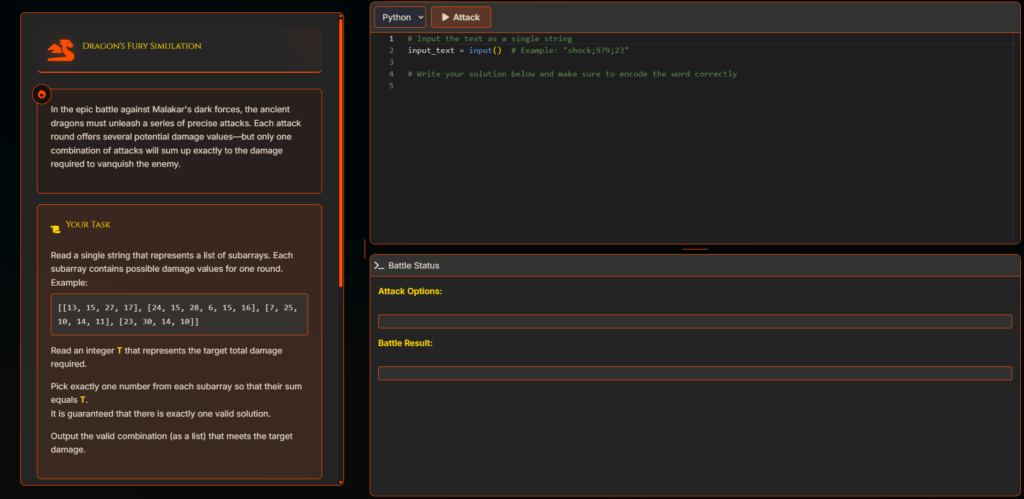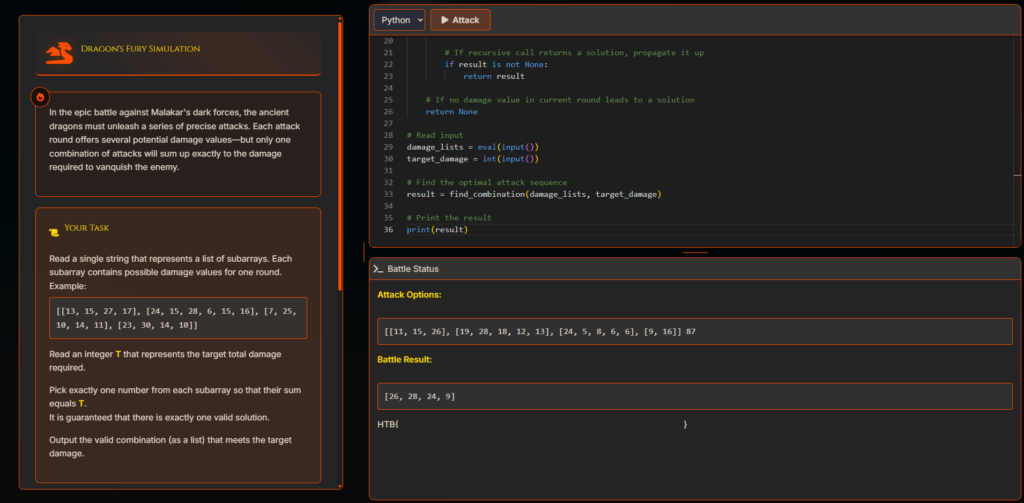🐲 Dragon Fury 🔥
📜 Tales From Eldoria
🗡️ Synopsis
In this epic finale, we must guide the dragons’ attacks against Malakar’s dark forces. The challenge is to select precise damage values from each round of attacks such that their sum exactly matches the total damage required for victory. By harnessing the power of recursion and backtracking, we can determine the optimal combination of strikes to vanquish the enemy and save Eldoria!
📜 Description
The fate of Eldoria hangs in the balance as the ancient dragons face off against Malakar’s army in a decisive battle. Each round, the dragons can choose from several potential damage values for their attacks. However, only one specific combination of these values across all rounds will sum up to the exact total damage needed to secure victory.
Our task is to analyze the damage possibilities for each round and select the single value from each that, when added together, equals the target total damage. With this perfect attack sequence, the dragons can unleash their fury with surgical precision and emerge triumphant.
🛡️ Skills Required
To overcome this challenge, you’ll need:
- 🐍 Familiarity with Python syntax and data structures
- 🌳 Understanding of recursion and backtracking algorithms
- 🧩 Ability to break down the problem into smaller subproblems
- 📥 Careful attention to the input format and constraints
- 🧠 Logical thinking to optimize the solution
🏆 Skills Learned
By solving this challenge, you’ll gain:
- 💡 Experience implementing recursive functions in Python
- 🔍 Practice with backtracking to solve combinatorial problems
- ⚡ Insight into optimizing search algorithms
- 💪 Confidence in tackling complex problems by divide-and-conquer approach
- 📈 Improved problem-solving skills for coding challenges
⚔️ Solving The Challenge
Let’s break down the challenge and build our solution step-by-step.
📥 Understanding the Input Format

The input starts with a string on the first line representing a list of lists. Each inner list represents a round of attacks and contains the possible damage values for that round.
For example:
[[13, 15, 27, 17], [24, 15, 28, 6, 15, 16], [7, 25, 10, 14, 11], [23, 30, 14, 10]]This signifies 4 rounds of attacks. In the first round, the possible damage values are 13, 15, 27, and 17. In the second round, the options are 24, 15, 28, 6, 15, and 16, and so on.
The second line of input is an integer T representing the target total damage that needs to be achieved.
🧩 Breaking Down the Problem
To find the attack sequence that sums exactly to the target damage, we need to:
- Pick one damage value from each round’s list
- Ensure that the sum of the picked values equals the target damage
This is a classic combinatorial problem that can be solved using a recursive backtracking approach. Here’s the general idea:
- We’ll write a recursive function that takes the list of rounds, the target damage, the current round index, the current sum, and the current sequence of picked values.
- For each damage value in the current round:
- We’ll add it to the current sequence and update the current sum.
- If the updated sum exceeds the target, we know this branch won’t lead to a solution, so we can stop exploring it (this is an optimization).
- Otherwise, we recursively call the function for the next round with the updated sum and sequence.
- If at any point the sum equals the target and we’ve used all the rounds, we’ve found a valid solution and can return it.
- If we’ve exhausted all possibilities and haven’t found a solution, we return
Noneto signal failure.
This process effectively explores all possible combinations of damage values across the rounds, backtracking when the sum exceeds the target, and stopping when a valid solution is found.
🐉 Implementing the Dragon’s Fury
Let’s translate this approach into Python code:
def find_combination(rounds, target, current_index=0, current_sum=0, current_path=[]):
# Base case: If we've used all rounds
if current_index == len(rounds):
# If the sum equals the target, we've found a solution
if current_sum == target:
return current_path
return None
# Try each damage value in the current round
for value in rounds[current_index]:
new_path = current_path + [value]
new_sum = current_sum + value
# Optimization: If sum exceeds target, stop exploring this branch
if new_sum > target:
continue
# Recursive call for next round
result = find_combination(rounds, target, current_index + 1, new_sum, new_path)
# If recursive call returns a solution, propagate it up
if result is not None:
return result
# If no damage value in current round leads to a solution
return None
# Read input
damage_lists = eval(input())
target_damage = int(input())
# Find the optimal attack sequence
result = find_combination(damage_lists, target_damage)
# Print the result
print(result)
Time to break down the code!
def find_combination(rounds, target, current_index=0, current_sum=0, current_path=[]):
# Base case: If we've used all rounds
if current_index == len(rounds):
The function accepts five parameters:
rounds: The 2D array of possible damage values for each roundtarget: The exact damage total we need to achievecurrent_index: Which round we’re currently examiningcurrent_sum: Running total of damage accumulated so farcurrent_path: The sequence of damage values chosen up to this point
# If the sum equals the target, we've found a solution
if current_sum == target:
return current_path
return None
When we’ve processed all rounds, we check if we’ve hit our target exactly. If yes, we return our path as the solution. If not, this branch was unsuccessful, so we return None.
# Try each damage value in the current round
for value in rounds[current_index]:
new_path = current_path + [value]
new_sum = current_sum + value
Here we explore each possible damage value in the current round, creating a new path and calculating the new running sum.
# Optimization: If sum exceeds target, stop exploring this branch
if new_sum > target:
continue
This crucial optimization prevents wasted computation by abandoning paths that have already exceeded our target damage.
# Recursive call for next round
result = find_combination(rounds, target, current_index + 1, new_sum, new_path)
# If recursive call returns a solution, propagate it up
if result is not None:
return result
We recursively try the next round with our updated values. If any recursive call returns a solution, we immediately pass it up the call stack without exploring other possibilities.
# If no damage value in current round leads to a solution
return None
If we’ve exhausted all values in the current round without finding a solution, we report failure to the previous level.
# Read input
damage_lists = eval(input())
target_damage = int(input())
# Find the optimal attack sequence
result = find_combination(damage_lists, target_damage)
# Print the result
print(result)
The main program reads the input, calls our recursive function, and outputs the result.

👨💻Performance Limitation
This approach works efficiently only with small arrays because:
The algorithm has exponential time complexity O(m^n), where m is the average number of damage values per round and n is the number of rounds. For large inputs, the number of combinations explored grows astronomically, making the solution impractical.
Additionally, the recursion depth is limited by Python’s call stack, and mutable default arguments (current_path=[]) can cause unexpected behavior if not understood properly.
For larger datasets, a dynamic programming approach would be more appropriate, trading memory usage for significant speed improvements.
🎉 Victory in the Dragon’s Arena!
Congratulations, valiant dragon commander! Your strategic prowess and coding mastery have led the dragons to a glorious victory against Malakar’s forces. The battlefield echoes with the triumphant roars of the dragons as the enemy retreats in defeat.
Through this challenge, you’ve not only sharpened your problem-solving skills but also gained valuable experience in recursion, backtracking, and combinatorial optimization. These techniques will serve you well in future algorithmic battles.
But the war is not yet over. As the dust settles and the dragons catch their breath, new challenges await on the horizon. Keep honing your skills, for Eldoria will surely call upon your talents again.
So rest well, brave coder, and prepare for the next epic coding adventure. The dragons stand ready to follow your command and unleash their fury once more. Together, we shall protect the realm of Eldoria and vanquish all who threaten its peace!
🗺️ Ready for More Adventures?
Want to explore more Cyber Apocalypse 2025 writeups? Check out my other solutions here!
